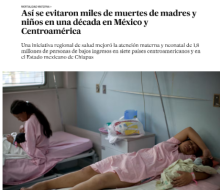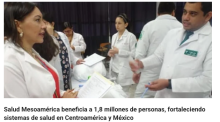Regional Malaria Elimination Initiative Panama Baseline Measurement (2019-20)
The RMEI baseline measurement was designed to measure the status of key indicators to capture performance along the trajectory of the “Detection, Diagnosis, Treatment, Investigation, and Response (DTI-R)” management strategy. These include the supply of inputs for diagnosis and treatment, the proportion of suspected cases tested for malaria, the timeliness of detection and treatment of confirmed cases, the frequency and quality of reporting of cases and laboratory production, and the coverage of vector control interventions carried out in households at risk of infection.
Regional Malaria Elimination Initiative El Salvador Baseline Measurement (2019-20)
The RMEI baseline measurement was designed to measure the status of key indicators to capture performance along the trajectory of the “Detection, Diagnosis, Treatment, Investigation, and Response (DTI-R)” management strategy. These include the supply of inputs for diagnosis and treatment, the proportion of suspected cases tested for malaria, the timeliness of detection and treatment of confirmed cases, the frequency and quality of reporting of cases and laboratory production, and the coverage of vector control interventions carried out in households at risk of infection.
Regional Malaria Elimination Initiative Belize Baseline Measurement (2019-20)
The RMEI baseline measurement was designed to measure the status of key indicators to capture performance along the trajectory of the “Detection, Diagnosis, Treatment, Investigation, and Response (DTI-R)” management strategy. These include the supply of inputs for diagnosis and treatment, the proportion of suspected cases tested for malaria, the timeliness of detection and treatment of confirmed cases, the frequency and quality of reporting of cases and laboratory production, and the coverage of vector control interventions carried out in households at risk of infection.
Regional Malaria Elimination Initiative Colombia Baseline Measurement (2020)
The RMEI baseline measurement was designed to measure the status of key indicators to capture performance along the trajectory of the “Detection, Diagnosis, Treatment, Investigation, and Response (DTI-R)” management strategy. These include the supply of inputs for diagnosis and treatment, the proportion of suspected cases tested for malaria, the timeliness of detection and treatment of confirmed cases, the frequency and quality of reporting of cases and laboratory production, and the coverage of vector control interventions carried out in households at risk of infection.
Regional Malaria Elimination Initiative Dominican Republic Baseline Measurement (2019)
The RMEI baseline measurement was designed to measure the status of key indicators to capture performance along the trajectory of the “Detection, Diagnosis, Treatment, Investigation, and Response (DTI-R)” management strategy. These include the supply of inputs for diagnosis and treatment, the proportion of suspected cases tested for malaria, the timeliness of detection and treatment of confirmed cases, the frequency and quality of reporting of cases and laboratory production, and the coverage of vector control interventions carried out in households at risk of infection.
Regional Malaria Elimination Initiative Costa Rica Baseline Measurement (2019)
The RMEI baseline measurement was designed to measure the status of key indicators to capture performance along the trajectory of the “Detection, Diagnosis, Treatment, Investigation, and Response (DTI-R)” management strategy. These include the supply of inputs for diagnosis and treatment, the proportion of suspected cases tested for malaria, the timeliness of detection and treatment of confirmed cases, the frequency and quality of reporting of cases and laboratory production, and the coverage of vector control interventions carried out in households at risk of infection.



